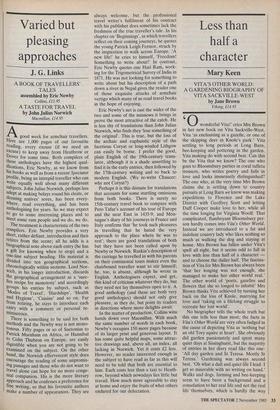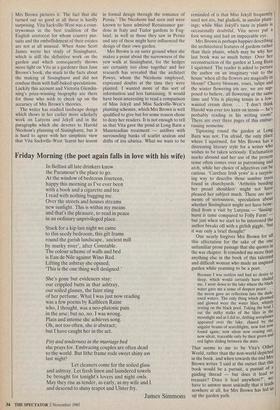Less than half a character
Mary Keen
VITA'S OTHER WORLD: A GARDENING BIOGRAPHY OF VITA SACKVILLE-WEST by Jane Brown
Viking, £14.95
0 wonderful Vita!' cries Mrs Brown in her new book on Vita Sackville-West. Vita 'as enchanting as a gazelle, or one of the skipping deer in Knole's park.' Vita settling to long periods at Long Barn, bee-keeping and pottering in the garden. Vita making do with second best. Can this be the Vita that we know? The one who goes to Bloomsbury parties in coral taffeta trousers, who writes poetry and falls in love and looks immensely distinguished? The one who, at the very time Mrs Brown claims she is settling down to country pursuits at Long Barn we know was making expeditions to Florence and the Lake District with Geoffrey Scott and letting Duff Cooper make love to her, while all the time longing for Virginia Woolf. That complicated, flamboyant Bloomsbury per- son hardly comes into Vita's Other World. Instead we are introduced to a fat and indolent country lady who likes nothing so much as walking the dog and staying at home. Mrs Brown has fallen under Vita's spell all right, but it seems odd to fall in love with less than half of a character and to choose the duller half. The fascina- tion of Vita for Mrs Brown has always been `that her longing was not enough, she managed to make her other world real.' The other world of 'poets, gazelles and flowers that she so longed to inhabit' Mrs Brown thinks Vita achieved by turning her back on the loss of Knole, marrying for love and 'taking on a lifelong struggle to recreate her lost world'.
No biographer tells the whole truth but this one tells less than most; the facts in Vita's Other World are very often fudged in the cause of depicting Vita as 'nothing but an old Tory squire at heart'. She obviously did garden passionately and spent many quiet days at Sissinghurst, but the majority of entries in her diary read like this one: `All day garden and St Teresa. Mostly St Teresa.' Gardening was always second best. `Oh what a dull and quiet life I lead. I get so miserable with no writing on hand.' Walks and dogs, farming and bee-keeping seem to have been a background and a consolation to her real life and not the real life themselves, which is hardly the way Mrs Brown pictures it. The fact that she turned out so good at all these is hardly surprising. Vita Sackville-West was a coun- trywoman in the best tradition of the English aristocrat for whom country pur- suits and the embellishment of their estates are not at all unusual. When Anne Scott James wrote her study of Sissinghurst, which is still the definitive work on the garden and which consequently throws more light on Vita as a gardener than Jane Brown's book, she stuck to the facts about the making of Sissinghurst and did not confuse them with half-baked speculations. Luckily this account and Victoria Glendin- ning's prize-winning biography are there for those who wish to check up on the accuracy of Mrs Brown's theories.
The writer has studied landscape design which shows in her earlier more scholarly work on Lutyens and Jekyll and in the paragraphs which she devotes to Harold Nicolson's planning of Sissinghurst, but it is hard to agree with her simplistic view that Vita Sackville-West 'learnt her lesson in formal design through the romance of Persia.' The Nicolsons had seen and were known to have admired Renaissance gar- dens in Italy and Tudor gardens in Eng- land, as well as those they saw in Persia and any of these might have influenced the design of their own garden.
Mrs Brown is on surer ground when she makes a point about the narrowness of the yew walk at Sissinghurst, for the hedges are certainly too close together and her research has revealed that the architect Powys, whom the Nicolsons employed, expressed doubts at the time they were planted. I wanted more of this sort of information and less fantasising. It would have been interesting to read a comparison of Miss Jekyll and Miss Sackville-West's planting schemes, which Mrs Brown is well qualified to give but for some reason chose to deny her readers. It is not enough to tell us that Vita gave the pond at Long Barn a Munsteadian treatment — astilbes with surrounding banks of scarlet azaleas and drifts of iris sibirica. What we want to be reminded of is that Miss Jekyll frequently used not iris, but gladioli, in similar plant- ings; while Miss Jekyll's taste in plants is occasionally doubtful, Vita never put a foot wrong and had an impeccable eye.
Mrs Brown is perhaps happier describing the architectural features of gardens rather than their plants, which may be why her last book was so much better. Over her reconstruction of the garden at Long Barn I squirmed. The reader is asked to picture the author on an imaginary visit to the house 'when all the flowers are magically in bloom!' Cherry blossom, roses, tulips and the winter flowering iris are, we are sup- posed to believe, all flowering at the same time and Vita is playing tennis in a low- waisted cream dress. . don't think Harold was ever too keen on tennis — he's probably reading in his writing room! There are over three pages of this embar- rassing nonsense. Tiptoeing round the garden at Long Barn was not, I'm afraid, the only place where I squirmed, for Mrs Brown has a distressing literary style for a writer who wishes to be taken seriously. Exclamation marks abound and her use of the present tense often comes over as patronising and arch, while her choice of adjectives can be curious. 'Carefree Irish yews' is a surpris- ing way to describe those sombre trees found in churchyards. 'Arthritis bending her proud shoulders' might not have pleased her subject much. There are mo- ments of seriousness, speculation about whether Sissinghurst might not have bene- fited from a visit by Lutyens — `Sissing- hurst is tame compared to Folly Farm' — but just when we start to be interested the author breaks off with a girlish giggle, 'but it was only a brief thought!' One nearly forgives Mrs Brown for all this affectation for the sake of the one unfamiliar prose passage that she quotes in the war chapter. It reminded me more than anything else in the book of this talented and difficult woman who made an inspired garden while yearning to be a poet.
Because I was restless and had no desire to sleep, which would certainly have eluded me, I went down to the lake where the black water gave me a sense of deepest peace • • • the moon gave no reflection into the dark- ened waters. The only thing which gleamed and glowed were the water lilies, whitely resting on the black pool. Taking the boat I cut the milky stalks of the lilies in the moonlight and as I did so, drifting aeroplanes appeared over the lake, chased by the angular beams of searchlights, now lost now found again; now silent now roaring out, now silent, traceable only by their green and red lights sliding between the stars.
That seems to me to be Vita's Other World, rather than the non-world depicted in the book, and when towards the end Mrs Brown writes 'I said at the outset that this book would be a pursuit, a pursuit of a guiding thread — but does it lead to treasure? Does it lead anywhere?', we have to answer most unkindly that it leads nowhere at all, for Mrs Brown has led us up the garden path.























































 Previous page
Previous page